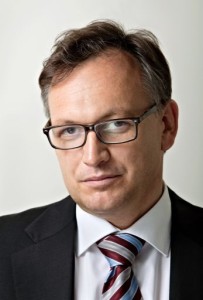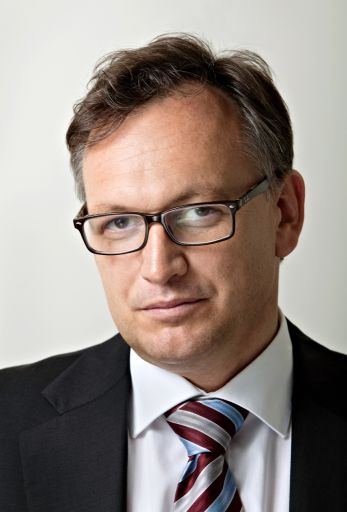 Marc-Tell Madl is a German-Hungarian lawyer and former PwC partner who provides a unique perspective on Central Europe. He is now using his connections and talents in the legal recruiting sphere for Legalis Global.
Marc-Tell Madl is a German-Hungarian lawyer and former PwC partner who provides a unique perspective on Central Europe. He is now using his connections and talents in the legal recruiting sphere for Legalis Global.
Marc-Tell, we’re so pleased to have you on board as an interim director. Can you give us a sense of your background?
I’m a German and Hungarian attorney. I was born and raised in Germany, and I studied close to Frankfurt and in the UK. After I became an attorney, I was keen to go to Central Europe and Hungary in particular because of family ties, but also because I saw it as a dynamic region, which provided new challenges and opportunities for a young attorney.
However, after graduation, first I decided to practice law in Frankfurt with Freshfields, and later with Haarmann Hemmelrath in order to learn the trade. During the 1990s venture capital experienced its first peak in Germany. Being with a leading tax firm we were very busy structuring deals in the biotechnology industry. I also prepared the launch of the Hungarian operations of the firm. Subsequently, in 1999, I spent some time in Boston before heading to Budapest to run the office. It was an exciting time. Business was booming, and the economy was in flux and transformation. It was a challenging period; one that demanded and allowed for considerable flexibility. Such challenges as we encountered were lack of expertise and resources. There were also problems with infrastructure as you might find in any developing market. I ran the law firm from 1999-2003 before deciding to move on to PwC CEE/CIS as a legal partner.
Being a German native with PwC in Hungary I naturally focused on German clients. However, the first investment funds were moving into the country. I always loved this space, and I established the international financial service business for the firm, advising almost all of the international funds. Moreover, I was quite successful in expanding the business to the whole industry and banks, advising also new financial products and so-called alternatives as well. In 2004, when Hungary joined the EU, the market became even more dynamic and we were able to capitalize on that by developing clients and a number of funds that were operational throughout the country.
The market in Hungary was strong at this time, but economic and political stagnation became imminent in 2008. It was during this time that I transferred to the Kyiv office of PwC. It developed well despite the economic catastrophe that struck that year. I developed a legal team, new products, new segments that had not yet been developed. We managed well as a legal team. Technically I did put a lot of emphasis on the development of tax litigation as a quite new service offering within PWC in the country. During this time, the firm became the number one service provider for tax litigation.
After this assignment, in 2011 I moved to Slovakia to take over the Bratislava operations of PwC legal services where PwC had no legal presence and also to look into Prague. I established the firm, and worked to get it up and running. It was an entirely different market than Hungary or Ukraine. There was much more corporate and M&A work. In 2011, cost-consciousness among companies became even more obvious. After 2008, there was a new wave of cost cutting, including targeting the low hanging fruit of expenses. Since 2011, however, clients request more and more cost-driven restructuring like transformations and cross-border mergers. In the past, restructuring was mainly driven by using better tax structures. Today, however, corporate governance and lightening the overall structure – cost cutting is key.
What new business do you foresee in the region?
It’s important to remember that every country is different and has developed in different directions. This cannot be underestimated. All have their own rules, needs and development. As I already pointed out regarding Slovakia and the Czech Republic, what I do see is all these countries are improving their efficiencies, cross-border mergers, and local mergers. Clearly, corporate restructuring is not driven by expansion. but by making existing structures more efficient and cheaper. I wonder whether law firms can exploit this opportunity properly because they while many have deep understanding of corporate issues, most lack the tax expertise necessary to leverage it. Even though not the main driver anymore, tax is still a crucial part of the process.
In Hungary, real estate has been in trouble. Overall there is definitely a trend toward more manufacturing and automotive. These export-oriented industries are in good shape. Banking is still struggling and will continue to struggle. In the region, business may expand after certain adaptations, and Basel III and IV implementations have been made. In Hungary, of course, the trouble with Swiss franc-based loans adds an additional complexity to the situation the whole industry is in.
Energy is and will be an important topic. The main driver here is the Ukraine crisis; we need to change distribution channels and dependency on Russia. However, an additional driving force is energy change introduced by Germany and the readjustment of energy policy all over Europe. That will keep regulatory lawyers in the energy space busy. Finally advice around public procurement will further increase.
Overall, fees are down. They went down during the financial crisis and have not recovered to normal levels. They most likely never will. Clients have learned to bargain and put on pressure. This is hard to change. However, at the same time, law firms cannot give up quality will in an effort to regain profitability.
So what brings you to Legalis at this juncture in your career?
I just moved back to Hungary after five years. For a short period I still have to observe certain restrictions stemming from my previous role as a lawyer with a major firm. By nature, however, I am not one to rest on his laurels (laughing). Besides reconnecting and revitalizing long standing relationships in the country I want to see what the legal market is doing and what clients are doing. Legalis is a new dimension. It will be possible for me to meet new people and network. The legal market will pick up again in Hungary and the region and there will be more need for expertise and understanding of how the region works. I believe that understanding legal recruiting is just another way of understanding where this region is going. Clearly, capitalizing from my considerable experience in the region I can help Legalis and its clients to make the right choices.
So what’s next?
Eventually I plan to set up my own firm. Right now I am also thinking to join a bigger structure. However, in the meantime, for me, this experience with Legalis is a fantastic opportunity to meet talented people. I will continue to test the waters and to see which markets are really active and flex strategy accordingly. One of the best vantage points for this study is with a company like Legalis, with its penetration of multiple markets and the interconnectedness of its business in the CEE region.







